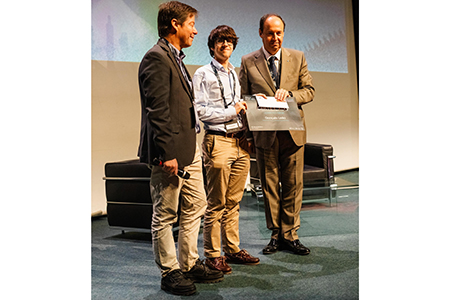On November 8th, the José Marques dos Santos Auditorium hosted Company’s Day, an event that takes place annually as part of the FEUP Prime programme, of which Águas do Douro e Paiva (AdDP) is a partner since December 2020, and which aims to bring together the dynamics of business, science and academia, among others, in order to value the talent and knowledge produced.
Immediately after the panel “The Intelligent Future” with speeches by Liliana Ferreira (DEI/Fraunhofer Portugal AICOS) and Luis Paulo Reis (DEI/LIACC), the latter presented the “Pitch Challenge“, a challenge in which four PhD students took the stage and described their research work.
Gonçalo Leão, a PhD student of the Doctoral Program in Informatics Engineering, won the challenge with ‘Robotic Bin Picking of Flexible Entangled Tubes‘, a work that is part of a line of research on the robotic manipulation of flexible objects that tend to become entangled. The specific aim of this project is to teach a robotic arm equipped with a 3D vision sensor to remove an object from a disorderly pile of entangled hooks, tubes or cables, so that no more objects are attached to it (a problem known in the industry as ‘bin picking’). To do this, Gonçalo is investigating how we can use supervised learning and reinforcement learning to determine which object the robot should grab, which part of the object to grab, and what movement the arm should make after the grab (for example, to rotate the arm so that an over-grabbed object falls back into the container).
Commenting on the award, which was presented by the Vice President of AdDP, Gonçalo says that the recognition is very important to him because “it represents the valorisation of work that has been time-consuming and very demanding”. The award shows that there is a demand in society and industry for this type of robotic solutions, which are useful in various production systems, such as the manufacture and installation of cables and wires in vehicles and household appliances, and also in recycling systems, where his work can serve as the basis for a selective waste collection system. The winner is grateful for all the support from his supervising team, composed by Professors Armando Sousa, Germano Veiga and Bruno Siciliano, and also from CRIIS, the INESC-TEC centre where he carries out his research, which has provided him with all the resources and support he needs to carry out his work.
